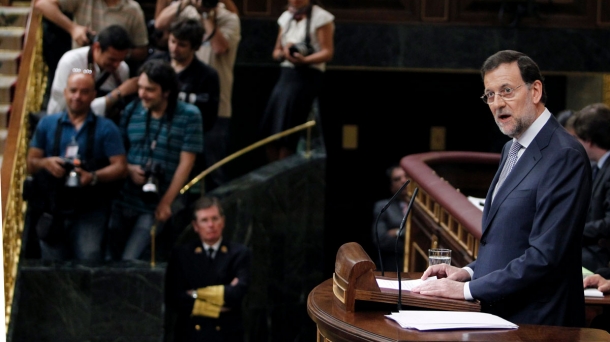news
New austerity measures
New measures put Spain under de facto supervision from Brussels
Reuters
Madrid
Analysts said the draconian savings plan, showed Spain was already under de facto supervision from Brussels even though it has not requested a sovereign bailout and retains access to bond markets.
-

Mariano Rajoy in the Spanish parliament. Photo: EFE
Recession-plagued Spain unveiled new austerity measures on Wednesday designed to slash 65 billion euros from the public deficit by 2014 as Prime Minister Mariano Rajoy yielded to EU pressure to try to avoid a full state bailout.
The conservative leader announced a 3-point hike in the main rate of Value Added Tax on goods and services to 21 percent and cuts in unemployment benefits and civil service pay and perks in a speech interrupted by jeers and boos from the opposition.
"These measures are not pleasant, but they are necessary. Our public spending exceeds our income by tens of billions of euros," he told parliament.
Anti-austerity protests in Madrid turned violent with police firing rubber bullets at protesters who pelted them with stones, fruit, bottles and firecrackers outside the industry ministry.
Tens of thousands or demonstrators joined hundreds of coal miners who had staged a long march from northern Spain in protest at cuts in mining subsidies they say will put them out of work, as public discontent over austerity measures grows.
Analysts said the draconian savings plan, tearing up several of Rajoy's campaign promises, showed Spain was already under de facto supervision from Brussels even though it has not requested a sovereign bailout and retains access to bond markets. Some said the tax increases could exacerbate the recession.
Madrid won softer deficit targets from its European Union partners this week and also negotiated rescue aid of up to 100 billion euros ($123 billion) from the euro zone's bailout fund for its crippled banking sector.
In line with demands from the European Commission, Rajoy announced new indirect taxes on energy, plans to privatise ports, airports and rail assets, and a reversal of property tax breaks that his Popular Party had restored last December.
Keeping one election promise, Rajoy did not touch pensions but he said he would discuss with the Socialist opposition a change to the system based on EU recommendations to link benefits to life expectancy.
He also said the tax burden was being shifted from taxes on labour and income to consumption and energy in line with European policy.
With five years of economic stagnation and recession, unemployment at 24.4 percent and tax revenue falling, Spain is struggling to reduce the deficit after far overshooting its target last year.
The high deficit and weak banks are now at the centre of the euro zone's debt crisis as investors fret that Spain could join Greece, Portugal and Ireland in needing a sovereign bailout.
Madrid's borrowing costs have soared in recent months, with the yield on the 10-year government bond breaching the 7 percent level regarded as unsustainable in the long run. On Wednesday, that yield fell to 6.81 percent.
"To avoid bankruptcy"
In Brussels, the European Commission welcomed the new fiscal programme, calling it an important step to ensure this year's fiscal targets are met. In its annual assessment of the Spanish economy released in May the EU executive had recommended most of the measures announced on Wednesday.
"This is a clear demonstration of the macroeconomic conditionality that we had to accept in exchange for the banking aid and in exchange for more time to cut the deficit to 3 percent," said Santiago Sanchez Guiu, economist at the Carlos III university in Madrid.
EU finance ministers agreed on Tuesday to give Spain an extra year until 2014 to bring the public deficit down to 3 percent of gross domestic product and relaxed this year's goal to 6.3 percent. However, a Commission document said even the easier target would be difficult to reach.
The latest measures completely overhauled Rajoy's previous budget plan, in which the central government and 17 autonomous regions had put in place some 48 billion euros in savings for 2012, insufficient to bring the deficit into line.
Rajoy announced reforms to city hall governments, shutdowns of public companies, reduced benefits for civil servants, budget cuts for political parties and labour unions.
The main civil service trade union responded by announcing work stoppages in July and a possible strike in September. Small groups of public workers protested outside parliament and the Popular Party's headquarters, chanting: "This is not a crisis, it's a rip-off."
Representatives of the key tourism and car industries said the sharp rise in Spain's sales tax rates would cost billions of euros in lost earnings and thousands of jobs.
The prime minister, who had pledged not to raise VAT, said he now had no choice. The main rate will rise to 21 from 18 percent and the reduced rate to 10 from 8 percent in a step that could further depress consumer spending. A government source told Reuters the increase would take effect on Aug. 1.
"We are living in a crucial moment that will determine the future of our families, our youth, our social welfare and all our hopes," Rajoy said. "That is the reality. We have to get out of this mess and we have to do it as soon as possible."
top stories



-
news
New anti-eviction law
Andalucia begins proceedings to seize confiscated houses from banks
-
news
London attack
British police ponder conspiracy after soldier murder
-
Sport
Giro d'Italia
Nibali tightens grip on overall lead after stage victory
© EITB - 2024 - Privacy Policy - Legal disclaimer - Cookie Policy - Cookie settings


